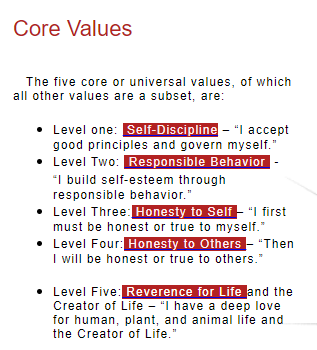
Self Discipline Values
“I accept good principles and govern myself.”
The worst education in the world that teaches nothing else but self-discipline is better than the best education in the world that teaches everything else but self-discipline.
Thomas Sterling
Self-discipline is a training of self that molds, corrects, strengthens or perfects according to a system of rules affecting conduct or action; to govern oneself after gaining knowledge of the principles, rules and laws governing a specific situation and perceiving them as good, reasonable, and beneficial to the individual and to the group.
Self-discipline is a training of self through:
- A knowledge of principles, rules, and laws of the home, the church, the community, the nation
- Understanding the underlying concepts
- Establishing family rules or laws
- Allowing natural/logical rewards or consequences to follow
- Retraining of self to choose to obey good and just laws
Responsible Behavior Values
“I build self-esteem through responsible behavior.”
Responsible behavior is defined as the ability to fulfill one’s needs in ways that do not deprive others of their needs. Responsible people act in ways that give feelings of worth to themselves and others. They maintain a satisfactory standard of behavior by correcting themselves when they do wrong and crediting themselves when they do right. Our below-standard conduct must be improved if we are to fulfill needs of self-worth; otherwise, we will suffer as acutely as when failing to love or be loved. Responsible behavior is intimately related to meeting our needs of self-worth.
A person who is responsible:
- Respects the rights of others
- Contributes to the good of the whole
- Thinks of others’ needs
- Organizes activities
- Sets goals and achieves them
- Accepts and fulfills commitments
- Manages resources
- Keeps living areas neat and clean
- Is prepared and productive
- Is dependable and consistent
- Controls emotions; is slow to anger
- Speaks the truth
- Uses appropriate language
Honesty to Self Values
“I first must be true to myself.”
To thine own self be true, and so it must follow as the night the day, thou canst not then be false to any man.
William Shakespeare (Hamlet)
Honesty is defined as not lying, cheating or stealing; being fair and upright; not hiding one’s real nature; being genuine, pure, respectable, free from fraud, and characterized by integrity.
Integrity is defined as a state or quality of being complete, undivided, unbroken; at unity with oneself; having soundness, purity, and sincerity. Integrity is not viewed as a value or concept to be taught in the same sense as honesty, but rather is a desirable, credible state of being or virtue that will become a characteristic of a person that has gained knowledge of, has internalized, and practices the total concept or value of honesty: to self and to others.
Integrity, freedom, and self-esteem are outcomes that occur naturally if one adheres to the principles, rules, and laws by which they are governed.
A person who is honest or true to self:
- Strives to become the best she or he was born to become
- Recognizes limits; has endurance; steadfastness
- Is sincere and genuine; motives are pure
- Controls excessive behavior
- Recognizes things for what they are
- Has thorough basic honesty; does not lie, cheat, steal
- Searches for truth
- Respects evidence
- Has appropriate abstinence
- Develops integrity or unity with self
Honesty to Others Values
“Then I will be true to others.” (Note: The definition is the same as for Honesty to Self; the sub-values are different.)
To thine own self be true, and so it must follow as the night the day, thou canst not then be false to any man.
William Shakespeare (Hamlet)
Honesty is defined as not lying, cheating or stealing; being fair and upright; not hiding one’s real nature; being genuine, pure, respectable, free from fraud, and characterized by integrity.
Integrity is defined as a state or quality of being complete, undivided, unbroken; at unity with oneself; having soundness, purity, and sincerity. Integrity is not viewed as a value or concept to be taught in the same sense as honesty, but rather is a desirable, credible state of being or virtue that will become a characteristic of a person that has gained knowledge of, has internalized, and practices the total concept or value of honesty: to self and to others.
Integrity, freedom, and self-esteem are outcomes that occur naturally if one adheres to the principles, rules, and laws by which they are governed.
A person who is honest to others:
- Lives the Golden Rule
- Has a sincere and open personality
- Is fair and straightforward
- Is comfortable with accountability
- Understands and builds trust relationships
- Is loyal to family, friends, associates, countrymen
- Has fidelity
Reverence for Life and The Creator of Life Values
“The worth of a soul is great in the sight of God.”
What is man that thou are mindful of him…for thou hast made him a little lower than the angels and hast crowned him with glory and honor. (Psalms 8:4-5)
A person who has a Reverence for Life has a deep, abiding love and respect for self and others, plant, and animal life; acknowledging God as the Creator of all life as well as all of the universe. The purpose of each is honored; that person is sensitive to the esthetic and excellent in law, literature, and the fine arts.
A person who has a reverence for life and the Creator of life:
- Respects the order of the universe and honors God as the creator of all within it
- Has a deep love for human, plant, and animal life and will care for each
- Is sensitive to the esthetic and the excellent in law, music, literature, fine arts, etc.
- Preserves the worth and dignity of the individual
- Creates an environment free from stress and anxiety
- Builds those who follow after